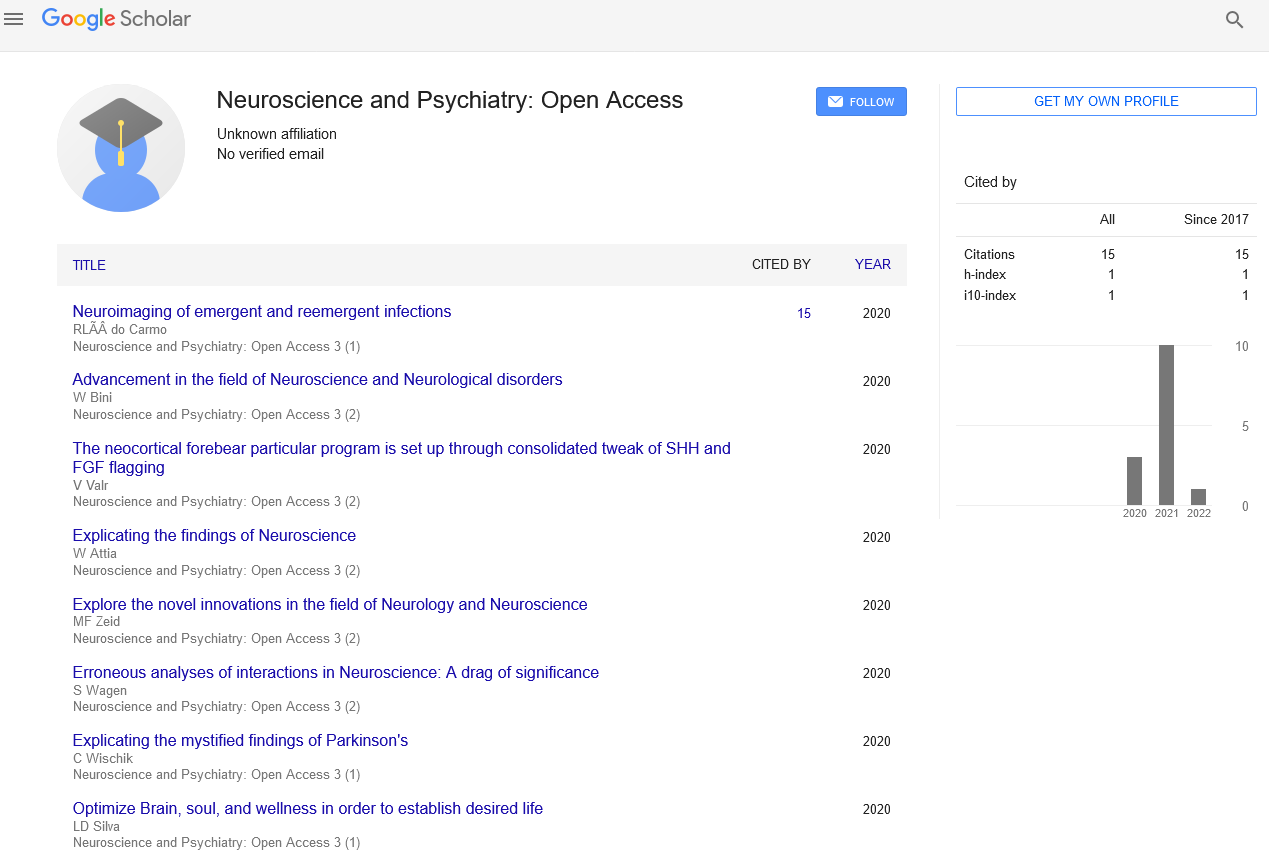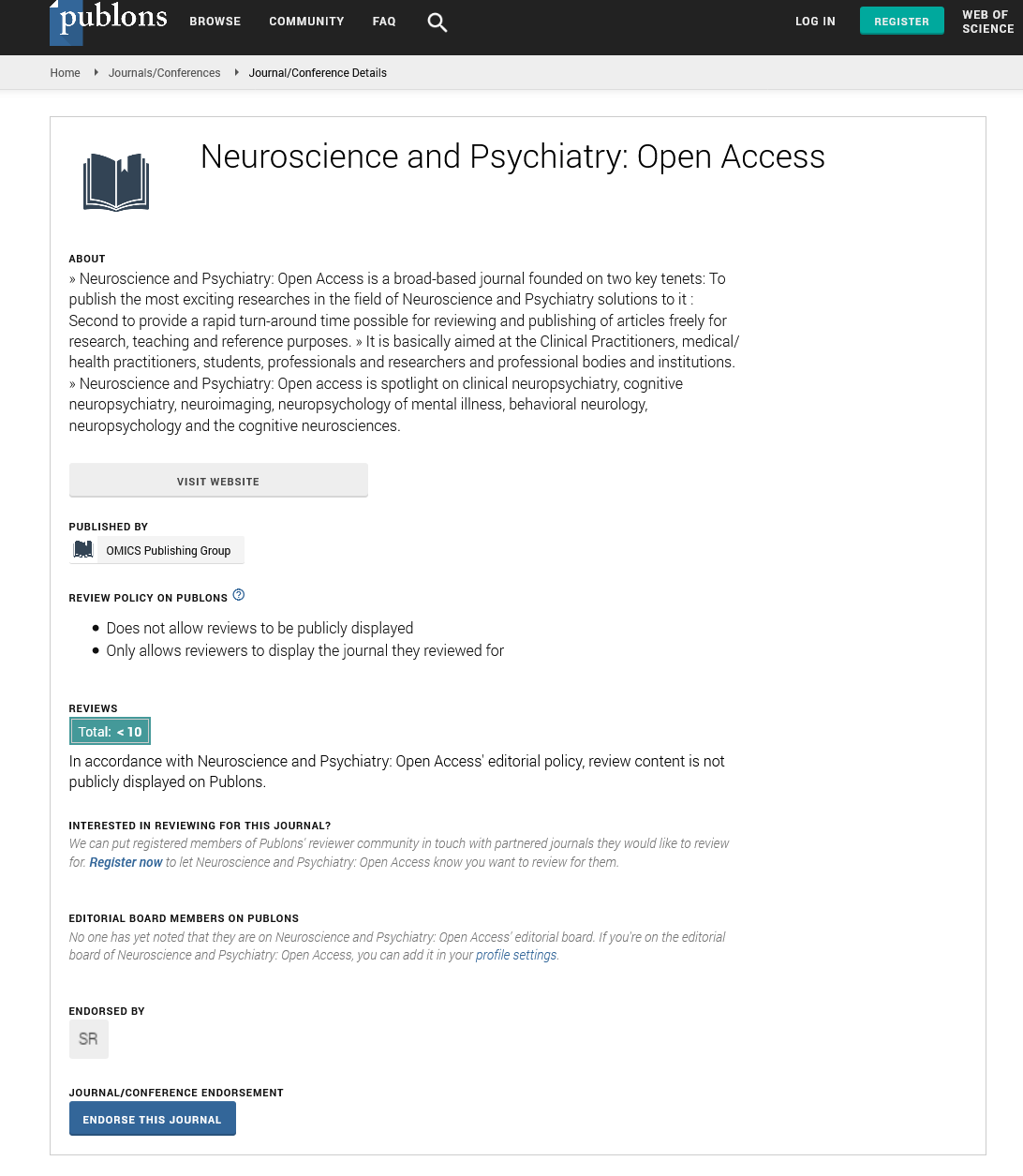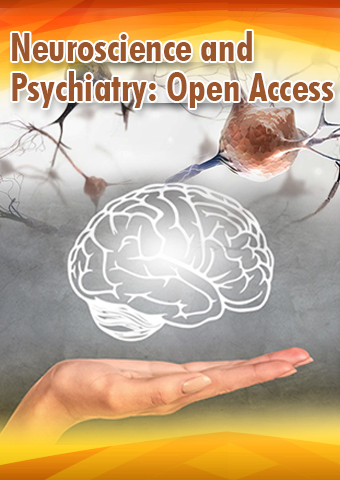Perspective - Neuroscience and Psychiatry: Open Access (2023) Volume 6, Issue 5
Exploring the Dynamic Realm of Psychosocial Research: Bridging Minds and Societies
- Corresponding Author:
- Helen Lavretsky
Department of Psychiatry and Behavioral Sciences, University of Minnesota, Minneapolis, USA
E-mail: hlavre@mednet.ucla.edu
Received: 01-09-2023, Manuscript No. NPOA-23-119201; Editor assigned: 04-09-2023, PreQC No. NPOA-23-119201 (PQ); Reviewed: 18-09-2023, QC No. NPOA-23- 119201; Revised: 25-09-2023, Manuscript No. NPOA-23-119201 (R); Published: 05-10-2023, DOI: 10.47532/npoa.2023.6(5).115-117
Introduction
Psychosocial research, a multidisciplinary field that straddles the intersection of psychology and sociology, delves into the complex interplay between an individual’s psychological well-being and the social environment they inhabit. This intricate relationship has far-reaching implications for understanding human behavior, mental health, and society as a whole. In this article, we will explore the world of psychosocial research, examining its key concepts, methodologies, and its profound impact on our understanding of the human experience.
Description
The foundations of psychosocial research
Defining the psychosocial perspective: The term “psychosocial” is a fusion of “psycho,” referring to the psychological or emotional aspects of an individual, and “social,” pertaining to the interactions and influences within a society or community. Psychosocial research, therefore, takes a comprehensive approach by considering both the internal psychological factors and the external social dynamics that shape human experiences.
Psychosocial research attempts to answer questions like: How do societal norms and institutions affect an individual’s mental health? What is the role of social support in emotional well-being? How do cultural beliefs and values shape our understanding of mental health and human behavior?
The influence of social factors on mental health: One of the core tenets of psychosocial research is understanding how social factors impact mental health. These factors can encompass a wide range of influences, including socioeconomic status, cultural norms, familial dynamics, and societal expectations.
For instance, individuals facing economic hardship or discrimination may experience chronic stress, which can have detrimental effects on mental health. Psychosocial research examines how these external stressors contribute to conditions like anxiety, depression, and Post-Traumatic Stress Disorder (PTSD). Additionally, it investigates the protective role of social support systems in mitigating the negative impact of these stressors.
The biopsychosocial model: The biopsychosocial model is a fundamental framework within psychosocial research. It posits that an individual’s health and well-being are shaped not only by biological factors but also by psychological and social influences. This model underscores the interconnectedness of these three dimensions, emphasizing the importance of a holistic perspective.
In this model, biological factors may include genetics and physical health, psychological factors encompass mental and emotional well-being, and social factors involve relationships, cultural influences, and societal structures. The biopsychosocial model is integral to understanding how individuals respond to illness, stress, and adversity.
Methodologies in psychosocial research
Surveys and questionnaires: Surveys and questionnaires are commonly used in psychosocial research to collect self-report data from participants. These tools allow researchers to gather information on a wide range of psychosocial factors, including stress, social support, coping strategies, and mental health symptoms. Researchers often use standardized measures to ensure consistency and comparability of data.
Interviews and qualitative research: Qualitative research methods, including in-depth interviews and focus groups, are employed to explore the experiences and perspectives of individuals in-depth. These methods allow for a nuanced understanding of complex psychosocial phenomena, such as the impact of cultural beliefs on mental health or the coping strategies employed by survivors of trauma.
Observational studies: Observational studies involve the systematic observation of individuals in their natural environment. Researchers may observe interactions within families, communities, or clinical settings to gain insights into social dynamics and their effects on mental health. Observational research is valuable for capturing real-world behavior and relationships.
Psychophysiological measures: Psychophysiological measures, such as heart rate, cortisol levels, and brain imaging, are used to assess the physiological responses to psychosocial factors like stress. These measures provide objective data on the interplay between the mind and body and how psychosocial factors can influence physical health.
Psychosocial research in action
Mental health interventions: Psychosocial research has informed the development of mental health interventions that address the psychosocial factors contributing to mental illnesses. For example, Cognitive-Behavioral Therapy (CBT), a widely used approach, teaches individuals to identify and modify maladaptive thought patterns and behaviors. CBT is grounded in the understanding that psychological factors play a pivotal role in mental health conditions.
Public health initiatives: Understanding the social determinants of health has led to the development of public health initiatives aimed at reducing health disparities. These initiatives seek to improve access to healthcare, reduce poverty, and enhance educational opportunities, ultimately promoting better mental health outcomes.
Culturally tailored interventions: Psychosocial research has highlighted the importance of culturally tailored interventions. These interventions acknowledge the influence of culture on mental health and aim to provide culturally sensitive care. By addressing cultural beliefs and norms, mental health services become more accessible and effective for diverse populations.
Challenges and future directions in psychosocial research
Multifaceted complexity: The multifaceted nature of psychosocial research poses challenges in understanding and isolating the effects of individual psychosocial factors. Human experiences are intricate, influenced by numerous interrelated elements, making it challenging to determine causality and develop effective interventions.
Intersectionality: Intersectionality is an emerging concept that recognizes the interconnectedness of multiple social identities, such as race, gender, and socioeconomic status. Psychosocial research is increasingly focused on understanding how these intersecting identities influence mental health and well-being. However, it requires more comprehensive methodologies and interventions that address the unique experiences of individuals at the intersection of multiple identities.
Expanding global perspective: As psychosocial research becomes more globalized, it is essential to incorporate diverse perspectives and voices from various cultures and communities. Collaborative research with a wide range of populations is crucial to ensure that interventions and policies are culturally relevant and sensitive.
Mental health policy and advocacy: Advocacy and policy initiatives are vital for translating psychosocial research into practical solutions. Researchers must work in tandem with policymakers and advocates to create evidencebased policies that address social determinants of health and promote mental well-being.
Conclusion
Psychosocial research stands at the nexus of psychology and sociology, offering a comprehensive lens through which to understand the complex interactions between psychological well-being and social influences. It has illuminated the profound impact of social determinants on mental health, informed the development of interventions, and promoted the acceptance of diverse perspectives in mental health research and practice.
The field of psychosocial research continues to evolve, addressing challenges and expanding its global reach. As it does, it promises to play a crucial role in reshaping our understanding of mental health, reducing disparities, and promoting the well-being of individuals and communities around the world. In an increasingly interconnected and diverse society, the importance of this multidisciplinary field has never been greater.


